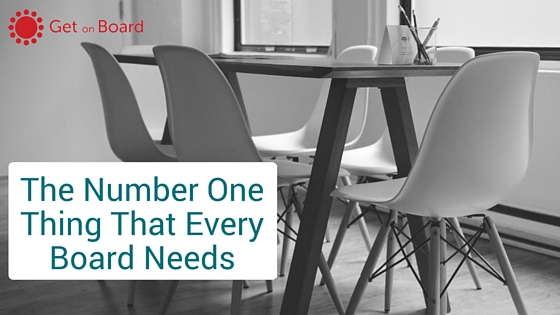The Number One Thing That Every Board Needs

Over the past couple of months I have been consciously giving some thought to what makes a great board great. And I think that I’ve managed to put my finger on what it is.
But before I get in to that, the first question I have to answer to give context to this whole post is “what is a great board?”
From my experience on boards over the past two and a half years I have recognised that “great” boards can be great in many different ways. However, there are many common elements amongst all of them.
Firstly, a great board is one where everyone shows up. Not just in body, but in mind as well. They have prepared, read the board pack, and are ready to contribute to the discussions.
Secondly, the conversations are candid and robust. The people around the board table clarify and challenge thinking in a respectful way, and they are not afraid to ask the questions that matter and that can be transformational to the way others think and how things are done.
Thirdly, they genuinely want to do the best for the organisation and want to see it succeed, without having to micromanage the Chief Executive. This requires a lot of ego control and being comfortable knowing that the job will get done even if its not done in the precise way that they would do it themself. They offer advice and suggestion based on what would return a benefit to the organisation and its people.
So what underpins all of these ‘great board’ attributes?
In my opinion there is one thing that is the enabler of all of the above outcomes and that makes a great board.
It is trust.
As a wise fellow board member said only last week – “Trust is a must”. To me it is the key that opens the door to a high-performing board, or any high-performing group of people.
All of the above greatness couldn’t happen if I was worried that no one had prepared for the meeting and I had to do the thinking for them; or I thought that every challenge to my opinion was a personal attack; or if everyone only cared about themselves and what they could get out the organisation by being on the board; or that I was afraid of the decisions my fellow board members were making (that I would be liable for) if I was absent from a meeting.
Trust is the foundation of all relationships, and the boardroom is no exception. If you feel that your board is not performing at its peak, try asking your fellow board members about their level of trust amongst the group. It could be an insightful and pivotal point for them and the board as a whole.
Subscribe to Receive Access to Articles, Resources, and Tools to Support Your Board Goals.

2 Comments
Comments are closed.